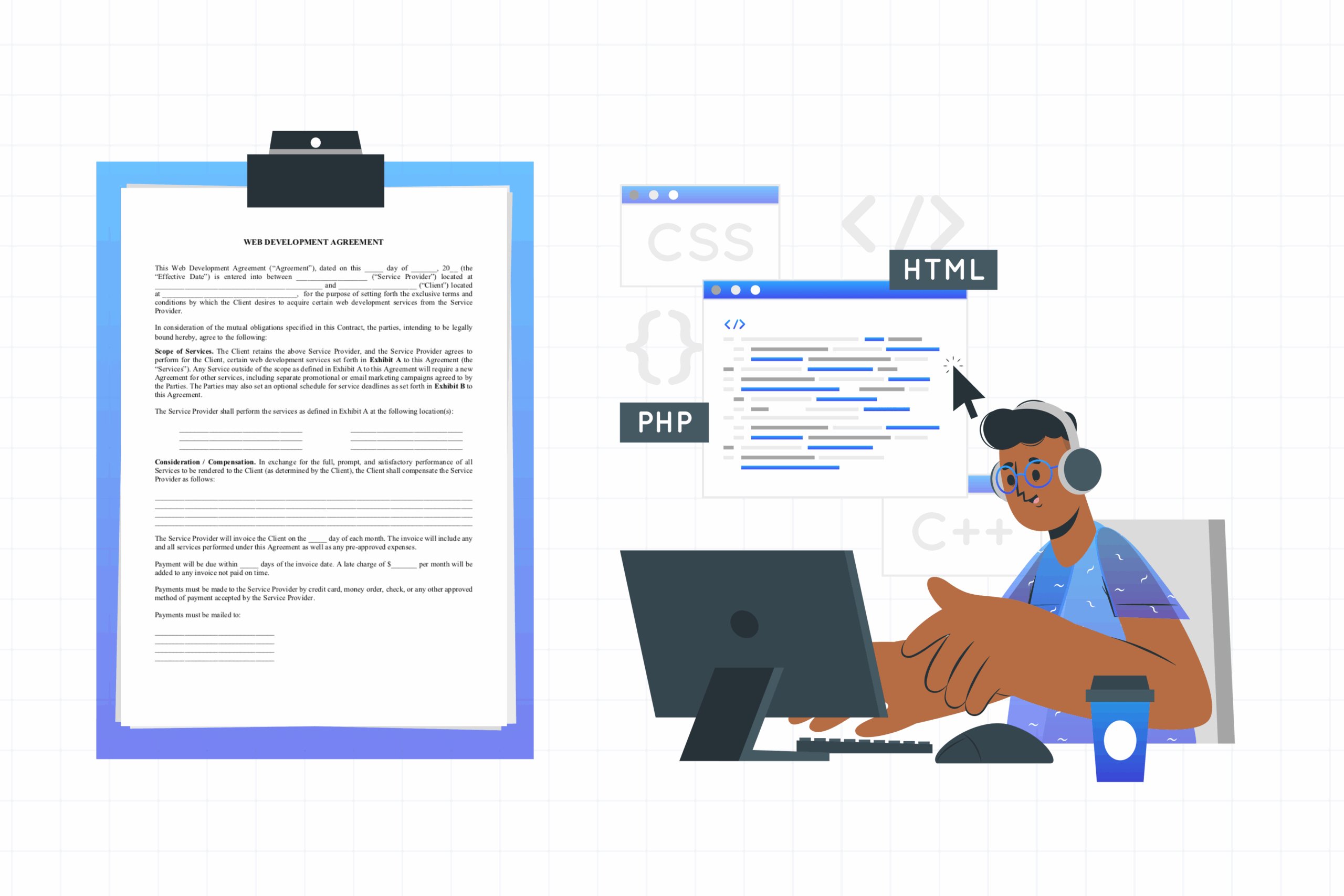
“Specificity is key. Defining what’s ‘done’ in a web developer contract isn’t just about deliverables—it’s about setting expectations, minimizing disputes, and protecting both parties.”
Ralph Sanchez, contract specialist
You kick off a new project with excitement. You outline the basics, start, and write code. Then scope starts to shift. The client wants more pages, tighter timelines but doesn’t mention budget. And when it’s time to invoice? Payment is delayed. Again.
On the other hand, clients can also get frustrated when freelancers disappear, miss deadlines, or don’t deliver what’s expected.
The real problem? No one set the rules.
No project scope. No timeline. No payment terms. No contract.
That’s why every freelance web developer (and agency) needs a solid contract not just to “look professional” but to protect the project from miscommunication, payment issues, and scope creep.
In this post, you’ll get:
- A free web development contract template, ready to use
- Key sections every dev project should include, like project overview, scope of work, payment terms, and IP ownership
- A step-by-step guide to customize and send your contract with OneSuite, including legally binding e-signatures
Build better projects, protect your work, and avoid client chaos, starting with a firm contract.
Download Your Free Web Development Contractor Template
A free OneSuite Web Development Contract Template is available, offering key sections for freelancers, clients, and agencies to initiate projects effectively
🚨Disclaimer: I’m not a legal expert (wish I were!). This template is a solid starting point, but it’s always smart to consult a legal professional to make sure everything’s in line with your specific needs and local laws.
How to Use and Customize This Web Development Contract Template
Writing contracts might not be your favorite task, but this one makes it painless. Whether you’re a freelance developer or a small agency, this template helps you look professional and stay protected.
Here’s how to make it your own:
🟨 Step 1: Fill in the Yellow Sections
Anywhere you see yellow highlights, that’s your cue. Fill in the blanks with:
- Your name, business name, and contact info
- Client’s full name and contact info
- Project title, scope of work, and key deliverables
- Start and end dates (or phase-by-phase deadlines)
- Payment terms: fixed rate, hourly, milestone-based, or retainer
- Invoicing schedule and payment method
- Revisions, late fees, or any out-of-scope pricing
- Signatures and dates
Tip: Be specific. A vague contract creates headaches later, set clear expectations now.
Step 2: Review with the Client
Before signing, send the draft to your client and walk through:
- Are the services and deliverables accurate?
- Is the payment structure and schedule clear?
- Are both sides aligned on who owns what (IP)?
- Do you both understand revision policies and termination rights?
Step 3: Clean and Finalize
Anywhere you see yellow highlights, that’s your cue. Fill in the blanks with:
- Remove all yellow highlights
- Check for typos, double spaces, or missing info
- Save the final version as a clean, secure PDF
Step 4: Sign and Store Securely
Use an e-signature tool like OneSuite to sign and send. It tracks signatures, keeps documents organized, and sends reminders if needed
No printer, no scanner, just smooth digital handling.
Want help sending or customizing your contract inside OneSuite?
👉 [Visit our Help Center] or start your free 14-day trial, no credit card needed.
👉 Watch how to send and sign your agreement in less than 3 minutes:
⚡️ See Also: How to Write a Contract Agreement: A Simple Step-by-Step Guide
What is a Web Development Contract?
A web development contract is a formal agreement between a client and a web developer that outlines the terms of the working relationship for a website project. This contract serves as a mutual understanding of what will be delivered, how the process will unfold, and what each party can expect from the other.
By putting everything in writing, it helps prevent misunderstandings, protects both sides legally, and ensures the project stays on track from start to finish.
For freelancers and clients alike, having a web development contract is essential. It sets clear expectations, establishes trust, and provides a safety net if any issues arise during the project.
In today’s fast-moving digital landscape, a contract isn’t just a formality it’s an innovative business tool that supports successful, stress-free collaborations.

Key Clauses in a Web Development Contract Template
Every contract should cover the key parts that protect both you and your client. Before using a web development contract template, make sure it includes these important sections:
Scope of Work
“A vague or loosely worded scope leads to disputes and misaligned expectations. Define the scope of work precisely, this is arguably the most critical part of the agreement.”
[SKCVC, legal and contract specialist]
The scope of work explains what you’re hired to do. It outlines the tasks, deliverables, and overall goals of the project. This section helps both you and the client understand what’s included, and, just as importantly, what’s not.
For freelance web developers, this part of the contract is essential. It prevents confusion, sets clear boundaries, and protects you from unpaid extra work.
Your project may fall into one of two categories:
- Project-based work – One-time tasks like building a website, creating a landing page, or developing a custom feature.
- Ongoing maintenance – Regular updates, bug fixes, backups, or small content changes after launch.
Be specific about what you’ll deliver, how it’ll be done, and when it’ll be completed. You can also attach a more detailed project brief or link to it in the contract for reference.
Project Timeline and Deliverables
The project timeline outlines when each part of the work will be completed. Deliverables are the actual results you’ll hand over, like a live website, a login system, or a responsive landing page.
This section is essential for both sides. It helps the developer stay accountable and keeps the client informed. A clear timeline builds trust, avoids confusion, and makes the project appear more professional from the outset.
For example, if you’re hired on Upwork as a QA tester for a one-time AI project, the project manager needs to know when bugs will be fixed and updates delivered. A timeline keeps everyone aligned and the project moving forward.
Every freelance contract should include this. It shows that you’re organised and serious about your work.
Payment Terms
Payment terms show the value of your work and protect how you get paid. This is one of the most important parts of your contract.
Make sure your contract clearly states whether you’re working hourly, monthly, or on a fixed project rate. Include the total payment amount (or rate), when payments are due, and how they’ll be sent.
You should also include:
- Upfront deposit before starting
- Milestone payments tied to key project stages
- Final payment before the final delivery
- Late fees for delayed payments
- Extra charges for out-of-scope work or overtime
These details help avoid payment issues and make sure you’re treated like a pro. Always set clear terms so your time and skills are respected.
Need a simple way to manage payments?
Try OneSuite’s invoicing system, free for 14 days. It helps you send branded invoices, track payments, and get paid faster.
Intellectual Property
Intellectual property (IP) means who owns the work you create. When you build a website or app for a client, the final product usually belongs to them after full payment is made.
However, that doesn’t mean you have to give up everything. Your contract should still allow you to show the project in your portfolio or share it on LinkedIn. That’s your proof of skill and it helps you land future clients.
If the client’s happy with your work, don’t forget to ask for a review or testimonial. It adds value to your reputation just like the project added value to theirs.
Termination Clause
Sometimes a project doesn’t go as planned. The client may want to pause or cancel it. That’s why every contract should include a clear termination clause.
It should explain how the project can be ended, what notice is required, and what happens to payments and work already completed. If there’s a legal issue, the clause also helps your lawyer understand your rights.
A proper termination clause protects the time and effort you’ve already put in. It also helps you close the project professionally, without confusion or conflict.
Confidential Information
When you work on a web development project, you often get access to important client data like source code, log in details, server credentials, and business strategies.
This information is private and valuable. Your contract should clearly state that you’ll keep everything confidential. That means no sharing, no public posts, and nothing passed to competitors.
Add a simple NDA (non-disclosure agreement) or include a confidentiality disclaimer directly in your contract. It shows you’re serious about protecting the client’s business, and it builds trust.
Use OneSuite to Build Your Contract in Minutes
Creating a free web development contract template in OneSuite is quick and hassle-free. Start by clearly outlining all services, deliverables and payment terms. You can either upload your finalized contract as a Docs file or use OneSuite’s editor to create it directly within the platform.
Here’s how to get started:
- Write Your Contract – Use OneSuite’s editor to create a clear contract outlining your services, deliverables, and payment terms.
- Upload to OneSuite – Go to the Documents section and upload your contract.
- Add Signature Fields – Add fields for both you and your client to sign and date the contract.
- Link to Client Profile – Attach the contract to the client’s profile for easy tracking.
- Send for Signature – Send the contract to your client via a secure link for signing.
- Lock Contract Automatically – Once signed, the contract will be locked automatically, providing a legally verified document.
- Save as a Template – Save the contract as a reusable template for future projects.
Ready to streamline your contract process? Create your free web development Contract template today with OneSuite! Save time, eliminate paperwork hassles and ensure smooth client projects.
Wrap-Up:
Ready to streamline your contract process?
Create your free web development
Contract template today with OneSuite! Save time, eliminate paperwork hassles and ensure smooth client projects.
A solid web contract template isn’t just paperwork, it’s how you protect your work, secure a steady income, and build trust with every client.
When expectations are clear from day one, projects run smoother, communication improves, and payments don’t slip through the cracks.
With OneSuite, you can create, send, and sign contracts in minutes, without juggling multiple tools or chasing signatures. It’s built to simplify your workflow so you can focus on what you do best: creating great websites and growing your business.
Start your free 14-day trial today and see how easy it is to manage contracts smartly. No credit card is required, and there is no friction, just one tool built to back you up.
𝌋 Access more professional templates :
Find a Better Way to Grow
OneSuite streamlines projects, clients, and payments in one place, making growth hassle-free.



